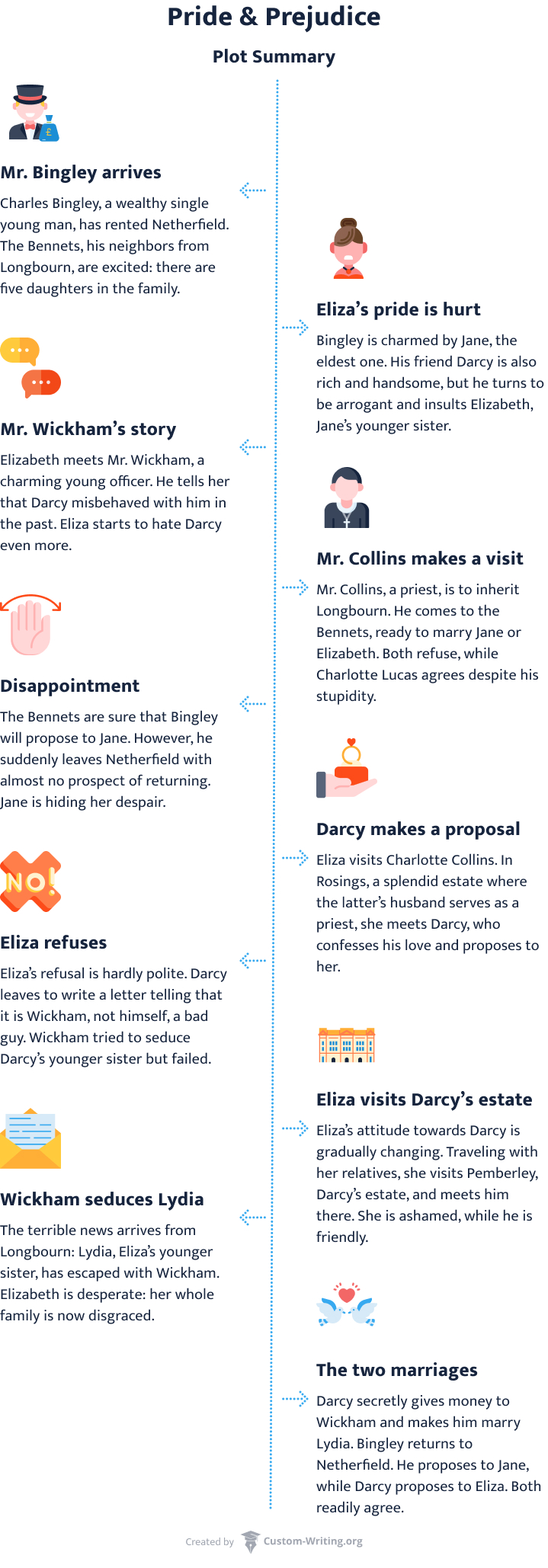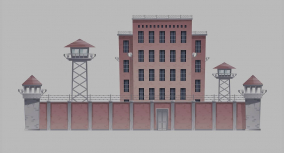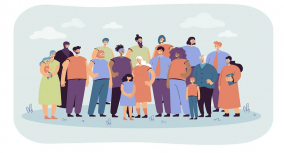Looking for a summary of Pride & Prejudice by Jane Austen? This Custom-Writing.org article contains everything you might need! In the first sections, you’ll find the novel’s synopsis and a plot infographic. Pride & Prejudice chapter summaries will follow.
❗ Pride and Prejudice Synopsis
Pride and Prejudice is a classic love story where an independent and intelligent woman is loved by a self-reserved and powerful man. It describes the provincial life of the British aristocracy at the beginning of the XIX century. The novel’s principal themes are love and the possibility to be the master of one’s own life.
📈 Pride and Prejudice Plot Diagram
Below is a plot infographic of Pride & Prejudice by Jane Austen. It contains all the novel’s key events. And if you ever pondered the question like “Who could write my summary on this story?” you’ll never encounter that issue again.

📖 Pride and Prejudice Chapter Summaries
Chapters 1-10
The Bennet family live in a modest estate called Longbourn in Hertfordshire, England. They are excited to know that Charles Bingley, a wealthy single young man, has rented the neighboring estate of Netherfield. There are five daughters in the family: Jane, Elizabeth, Mary, Catherine, and Lydia.
It is a truth universally acknowledged, that a single man in possession of a good fortune, must be in want of a wife.
Pride and Prejudice, Narrator, Chapter 1
Mrs. Bennet is making every effort to find a good match for the girls and asks her husband to visit Mr. Bingley. He refuses but later does as she asked. He understands that having their daughters married is essential. Still, it would be inappropriate for the girls to seek an introduction to the young gentleman.
A few days later, Mr. Bingley made a return visit to Mr. Bennet, but the meeting with the girls did not occur. They met at the ball in Meryton, where Mr. Bingley brought his sister Mrs. Hurst with her husband and Caroline, his youngest sister, as well as his friend, Mr. Darcy. All of them are extremely wealthy.
…his friend Mr. Darcy soon drew the attention of the room by his fine, tall person, handsome features, noble mien, and the report which was in general circulation within five minutes after his entrance, of his having ten thousand a year…. He was looked at with great admiration for about half the evening.
Pride and Prejudice, Narrator, Chapter 3
Darcy turns out to be arrogant and cold. Bingley tells him that Jane “is the most beautiful creature I have ever beheld,” suggesting to dance with Elisabeth. Darcy replies that she is not handsome enough to tempt him.
She is tolerable, but not handsome enough to tempt me; I am in no humour at present to give consequence to young ladies who are slighted by other men.
Pride and Prejudice, Mr. Darcy, Chapter 3
Elisabeth overhears them talk. Her feelings are hurt. The higher class does not impress her. Bingley is charmed by Jane, and so are his sisters. Darcy is very critical of her: “she smiled too much.” The prejudices have been formed, and all the subsequent events will describe how difficult they are to change.
The next morning, the Bennets go to discuss the ball with the Lucas family. From all appearances, Darcy has been rude to everyone. Charlotte Lucas, Elizabeth’s friend, remarks that Darcy “has a right to be proud” being so wealthy.
Gradually, Darcy starts noticing Eliza’s charm, and Bingley and Jane fall in love.
Caroline Bingley invites Jane to the Netherfield. Mrs. Bennet sends her daughter on horseback, not in a carriage, even though it is raining hard. She aims to make her stay at Bingley’s place overnight. Jane fell sick, and so it happened, making Mrs. Bennet delighted. Eliza walks three miles to visit her sick sister. Caroline shows disdain to Lizzy, even though Darcy and Bingley seem to be enjoying her company.
To walk three miles, or four miles, or five miles, or whatever it is, above her ankles in dirt, and alone, quite alone! What could she mean by it? It seems to me to show an abominable sort of conceited independence, a most country-town indifference to decorum.
Pride and Prejudice, Miss Bingley, Chapter 8
Caroline reproaches Eliza for using a “paltry device” to make Darcy like her upon her leave. A critical analysis suggests that Caroline would prefer to keep Darcy for herself.
Later, Mrs. Bennet visits sick Jane at the Netherfield. She says, “She is a great deal too ill to be moved,” insisting on prolonging Jane’s stay. Her hidden intentions are clear to everyone, and the situation gets embarrassing.
The next day, noticing Darcy’s growing attention to Eliza, Caroline tries to flirt with him. She makes awkward compliments on his handwriting. It did not work out, so she described to him the prospects of marrying into a poor family, playing on Darcy’s pride.
I hope… you will give your mother-in-law a few hints, when this desirable event takes place, as to the advantage of holding her tongue; and if you can compass it, do cure the younger girls of running after officers.
Pride and Prejudice, Miss Bingley, Chapter 10
Chapters 11-20
Darcy and Elizabeth share mutual remarks on their worst traits. Darcy’s is “to hate everybody,” and Eliza’s is “willfully to misunderstand them.” Both characters are prejudiced.
Mrs. Bennet refuses to send a carriage to bring Eliza and Jane back home. It put the entire family in a bad light, showing that the mother is ready to make her daughters beg to secure a marriage. It was a relief for Darcy, as Eliza attracted him more than he liked.
Darcy, after a few moments’ recollection, was not sorry for it. He began to feel the danger of paying Elizabeth too much attention.
Pride and Prejudice, Narrator, Chapter 11
Mr. Collins, a parish rector and Mr. Bennet’s relative, is to become the sole heir of the house in Longbourn. Women had no inheritance rights in the XIX century. His rights for the house are occasional, and his success as a priest was achieved by the patronage of wealthy Lady Catherine De Bourgh.
I have been so fortunate as to be distinguished by the patronage of the Right Honourable Lady Catherine de Bourgh, widow of Sir Lewis de Bourgh, whose bounty and beneficence has preferred me to the valuable rectory of this parish…
Pride and Prejudice, Mr. Collins, Chapter 13
Later, the reader will learn that Darcy’s aunt dreams of marrying her daughter with Darcy.
Despite his mediocre and ridiculous image, Mr, Collins intends to marry one of Mr. Bennet’s daughters. It is a good option for Mrs. Bennet because then they will not be thrown out of the house after her husband’s death. Jane is almost engaged, so Elizabeth will do: his love interest is inconsistent.
Mr. Collins and the sisters take a walk to Meryton, where they meet Mr. Wickham, Bingley, and Darcy. Darcy and Wickham are unhappily surprised to see each other.
At dinner, Wickham explains to Elizabeth that Darcy’s father was his godfather. He left him money to build a career at the ministry. Darcy was jealous and refused to give the money to Wickham.
Had the late Mr. Darcy liked me less, his son might have borne with me better; but his father’s uncommon attachment to me irritated him, I believe, very early in life. He had not a temper to bear the sort of competition in which we stood—the sort of preference which was often given me.
Pride and Prejudice, George Wickham, Chapter 16
Elizabeth’s prejudice against Darcy grows even stronger.
Elizabeth expects to dance with Wickham at the ball in Netherfield, but he does not come. She blames Darcy for his absence. Later, Caroline and Jane tell her that it was Wickham’s fault that his relationship with Darcy fell apart, but Eliza does not believe them.
The next morning, Mr. Collins made a marriage proposal to Elizabeth, stating three reasons: marriage is “a right thing for every clergyman,” it will “add greatly” to his happiness, and it is the “particular advice” of Lady Catherine.
You can hardly doubt the purport of my discourse, however your natural delicacy may lead you to dissemble; my attentions have been too marked to be mistaken. Almost as soon as I entered the house, I singled you out as the companion of my future life.
Pride and Prejudice, Mr. Collins, Chapter 19
As expected, Eliza refused.
Mrs. Bennet demands her husband to make Eliza change her mind. But Mr. Bennet tells Eliza a different thing.
An unhappy alternative is before you, Elizabeth. From this day you must be a stranger to one of your parents. Your mother will never see you again if you do not marry Mr. Collins, and I will never see you again if you do.
Pride and Prejudice, Mr. Bennet, Chapter 20
Chapters 21-30
The relationships are changing dramatically. Mr. Collins shifts his attention to Charlotte Lucas and engages with her, which infuriates Mrs. Bennet. Eliza invites Wickham to get acquainted with her parents. Caroline Bingley writes Jane a letter stating that everyone has left Netherfield for London. They will probably never return. She hinted that Georgiana Darcy could become Bingley’s wife.
I really do not think Georgiana Darcy has her equal for beauty, elegance, and accomplishments; and the affection she inspires in Louisa and myself is heightened into something still more interesting, from the hope we dare entertain of her being hereafter our sister.
Pride and Prejudice, Mrs. Bingley, Chapter 21
Elizabeth tries to reassure Jane that Bingley’s feelings for her are genuine. The prejudice of his sisters might be the case. Jane refuses to see Caroline’s stake in the situation. She has no prejudice, but it makes her even more blind than Elizabeth, who is disgusted with Bingley’s weakness.
Mr. and Mrs. Gardiner, the brother and his wife of Mrs. Bennet, pay a visit to Longbourn. Mrs. Gardiner replaces Mrs. Bennet as a caring mother for the daughters and reconciles the tense atmosphere in the family. She proposes that Jane stays at her place in London to distract herself. Elizabeth hopes that a meeting between Jane and Bingley could happen there but keeps silent.
Jane visited Caroline in London and vice versa, but both meetings were cold and pointless.
Wickham shifts his interest from Eliza to another woman who inherited £10,000. Elizabeth understands that she doesn’t love him, so there is no reason to care.
Elizabeth goes to visit Caroline at the parsonage home of Mr. Collins. On her way, she visits Jane in London. There she finds out that her sister has lost her illusions concerning Caroline’s friendship.
My dearest Lizzy will, I am sure, be incapable of triumphing in her better judgement, at my expense, when I confess myself to have been entirely deceived in Miss Bingley’s regard for me.
Pride and Prejudice, Jane Bennet, Chapter 26
Mr. Collins is too concerned about class and wealth for a clergyman. He points out the architectural design and furniture of his house. Caroline seems to have found a comfortable life with him, but not love and happiness.
The next day, Miss De Bourgh arrives. She invites everyone to dinner in Rosings. Elizabeth says she will make Mr. Darcy “a very proper wife.”
Miss de Bourgh was pale and sickly; her features, though not plain, were insignificant; and she spoke very little, except in a low voice, to Mrs. Jenkinson…
Pride and Prejudice, Narrator, Chapter 29
At Rosings, Lady Catherine behaves arrogantly. She commands all the time, and her opinions leave no room for other people’s thoughts. She instructs Charlotte on how to run a household. Then she asks Eliza several tactless questions about her upbringing, property, and absence of musical training.
Miss Bennet would not play at all amiss if she practised more, and could have the advantage of a London master. She has a very good notion of fingering, though her taste is not equal to Anne’s. Anne would have been a delightful performer, had her health allowed her to learn.
Pride and Prejudice, Lady Catherine de Bourgh, Chapter 31
Mr. Darcy visits Rosings with his cousin, Colonel Fitzwilliam. He also pays a visit to Mr. Collins, where he meets Elizabeth. When she asks him if he has seen Jane in London, he gets strangely confused.
Chapters 31-40
Chapter by chapter, the communication between Darcy and Elizabeth is growing warmer. During the next dinner at Rosings, they had a lively chat about her musical skills and his inability to approach strangers. Watching Darcy and Miss De Bourgh later, Eliza did not discern “any symptom of love.”
The next morning, Darcy visits Elizabeth. She is surprised, and their conversation is intermingled with awkward silences. Once again, Eliza asks him about the sudden departure of Bingley to London. He gives an evasive reply that, most likely, Bingley will never come back. When Darcy leaves, Charlotte remarks that the only probable reason for his visit was his love for Elizabeth.
My dear, Eliza, he must be in love with you, or he would never have called us in this familiar way.
Pride and Prejudice, Charlotte Lucas, Chapter 32
There were more short visits by Darcy and Colonel Fitzwilliam and occasional meetings in the countryside. Darcy is gloomy and reserved. Charlotte supposes that Fitzwilliam would be a better match for Eliza.
During one of their meetings, Fitzwilliam tells Elizabeth that Darcy interfered with one of his friends’ “most imprudent marriage.” She understands that it is about Bingley and Jane. She saw only selfishness in this act, not even thinking that Darcy could be trying to protect his friend from an interested marriage, as he was unsure of Jane’s feelings.
The next day, a major event took place: Darcy proposed to Elizabeth.
In vain I have struggled. It will not do. My feelings will not be repressed. You must allow me to tell you how ardently I admire and love you.
Pride and Prejudice, Mr. Darcy, Chapter 34
His proposal was refused. It was unwise to say that his love was stronger than his concerns about Elizabeth’s family.
I might as well inquire… why with so evident a desire of offending and insulting me, you chose to tell me that you liked me against your will, against your reason, and even against your character?
Pride and Prejudice, Elizabeth Bennet, Chapter 34
When he asks for an explanation, she replies that even the most favorable feelings would not make her accept the man who has been the means of ruining the happiness of her most beloved sister. Upon his leave, she started crying.
Later, Darcy gives Elizabeth a letter explaining the breakup between Bingley and Jane. Charlotte turned out to be right in Chapter 6: Jane should have shown her feelings more clearly. Darcy also clarified the conflict with Wickham. The latter spent money left by his godfather on parties and never attended law school. When Wickham asked Darcy for more money, he was refused. In some years, Wickham tried to seduce Darcy’s younger sister Georgiana. She was only 15 back then, but his plans became obvious. To protect his sister, Darcy kept everything in secret.
Mr. Wickham’s chief object was unquestionably my sister’s fortune, which is thirty thousand pounds; but I cannot help supposing that the hope of revenging himself on me was a strong inducement.
Pride and Prejudice, Mr. Darcy, Chapter 35
Eliza now realizes how prejudiced she has been. She gets ashamed of her behavior and prefers never to meet Darcy again.
On their way home, Eliza and Jane meet Lydia and Kitty. They keep talking about soldiers. Lydia is glad to tell that Wickham’s marriage prospects were unsuccessful and that he is available again.
Chapters 41-50
Wickham’s regiment is going to leave Meryton, and Lydia receives an invitation to come to Brighton from the wife of Colonel Forster. Elizabeth urges her father to forbid it, but he remarks that Lydia “is luckily too poor to be an object of prey to anybody.”
Elizabeth meets Wickham and makes it clear she knows the truth about him and Mr. Darcy. She also notes that now she understands Darcy much better.
When I said that he improved on acquaintance, I did not mean that his mind or his manners were in a state of improvement, but that, from knowing him better, his disposition was better understood.
Pride and Prejudice, Elizabeth Bennet, Chapter 41
Elizabeth plans to spend her summer with Mr. and Mrs. Gardiner. During their tour in Derbyshire, Mrs. Gardiner suggests visiting Pemberley. Elizabeth agrees when she learns that Darcy is not going to be there. But when she sees the beautiful and tasteful house, she imagines how it would feel like to be Darcy’s wife and live there.
And of this place… I might have been mistress! With these rooms I might now have been familiarly acquainted! Instead of viewing them as a stranger, I might have rejoiced in them as my own, and welcomed to them as visitors my uncle and aunt.
Pride and Prejudice, Elizabeth Bennet, Chapter 43
However, Darcy suddenly appears at home. Elizabeth feels uneasy, but Darsy is extremely polite and attentive to everyone. Darcy would like to introduce Eliza to his sister, Georgiana, the next day.
There is also one other person in the party… who more particularly wishes to be known to you. Will you allow me, or do I ask too much, to introduce my sister to your acquaintance during your stay at Lambton?
Pride and Prejudice, Mr. Darcy, Chapter 43
He is not a bit proud or arrogant anymore. In his proposal, he said he could overlook Eliza’s relatives. Now he is eager to make friends with them. He even tells Caroline that Elizabeth is one of the most beautiful women he knows.
Some days later, Elizabeth receives two horrible letters. In the first one, lost by the post, Jane tells her that Lydia ran away with Mr. Wickham to get married in Scotland. And in the second, the situation is even worse: Colonel Forster found out that Wickham was not going to marry her, and they returned to London.
…if he could form such a design against a young woman of Lydia’s connections, which is not likely, can I suppose her so lost to everything? Impossible!
Pride and Prejudice, Jane Bennet, Chapter 46
Running out of the house, Eliza meets Darcy and tells him the news. He wishes he could help and looks perplexed. Elizabeth and the Gardiners are on their way to Longbourn.
More news emerges when they arrive. Wickham is in large gambling debts. As Mr. Collins put it in his letter, Lydia’s death “would have been a blessing in comparison of this.” He refers to Lady Catherine, who condescendingly wonders, “who will connect themselves with such a family?”
Two days later, Lydia and Wickham are found. He is going to marry her, provided that Mr. Bennet pays him some money every year. Obviously, Mr. Gardiner has already paid him a lot, but Mrs. Bennet remarks that it was his duty as an uncle.
She will be married! I shall see her again! She will be married at sixteen! My good, kind brother! I knew how it would be. I knew he would manage everything! How I long to see her! and to see dear Wickham too! But the clothes, the wedding clothes!
Pride and Prejudice, Mrs. Bennet, Chapter 49
Elizabeth regrets that she told Darcy about the scandal, as she expects it will cause his distancing from their family. Mr. Bennet does not want the newly married to visit their place, but if he forbade, it would only make the rumors worse.
Chapters 51-61
The setting starts in Longbourn, where the Bennets meet Lydia and her new husband. She mocks at her sisters that they are not married yet.
Ah! Jane, I take your place now, and you must go lower, because I am a married woman.
Pride and Prejudice, Lydia Bennet, Chapter 51
Wickham behaves as there was nothing wrong with his actions.
During their visit, Elizabeth observes that Wickham has no feelings for Lydia. He has never had the intention to marry her. When they ran away from London, he took her for companionship to evade creditors.
Lydia blabbs that Darcy attended their wedding and preferred to keep it secret. Eager to know the reason, Elizabeth writes to Mrs. Gardiner. Her reply revealed that it was Darcy who found Wickham and prevented his escape to Europe. Darcy, not Mr. Gardiner, also paid Wickham to make him marry Lydia.
Will you be very angry with me, my dear Lizzy, if I take this opportunity of saying (what I was never bold enough to say before) how much I like him. His behaviour to us has, in every respect, been as pleasing as when we were in Derbyshire…
Pride and Prejudice, Mrs. Gardiner, Chapter 52
Very soon and surprisingly enough for the Bennets, Bingley, and Darcy visit them. Mrs. Bennet invites them to dinner. Bingley sits next to Jane, just as he used to do before, but Darcy sits as far from Elizabeth as possible. She thinks she has lost her chance to be with him.
In two days, Bingley makes Jane a proposal. Mrs. Bennet’s behavior was ridiculous when she cleared the room of everyone to leave Bingley and Jane alone as soon as he came. Still, Elizabeth thinks they will be happy in their marriage.
If you were to give me forty such men, I never could be so happy as you. Till I have your disposition, your goodness, I never can have your happiness. No, no, let me shift for myself; and, perhaps, if I have very good luck, I may meet with another Mr. Collins in time.
Pride and Prejudice, Jane Bennet, Chapter 55
A week later, Lady Catherine visits Longbourn and asks Elizabeth to take a walk with her. She says she is aware of the key events in Eliza’s relationship with Darcy. Lady Catherine thinks Eliza has tricked Darcy into making her a proposal and demands to promise her that she will never marry him. Indeed, Lady Catherine has always wanted him to marry her daughter, Miss De Bourgh.
Hear me in silence. My daughter and my nephew are formed for each other. They are descended, on the maternal side, from the same noble line…They are destined for each other by the voice of every member of their respective houses…
Pride and Prejudice, Lady Catherine de Bourgh, Chapter 56
Eliza refuses without hesitation.
The next day, Mr. Bennet jokingly congratulates Elizabeth on her engagement with Darcy. Mr. Collins wrote him a letter advising not to go against what Lady Catherine thinks to be right. Mr. Bennet does not believe the rumors.
Mr. Darcy, who never looks at any woman but to see a blemish, and who probably never looked at you in his life! It is admirable!
Pride and Prejudice, Mr. Bennet, Chapter 57
He believes that Elizabeth detests Darcy, and he does not care about her. Elizabeth is afraid that there is a grain of truth in his words, especially concerning Darcy’s indifference.
When Darcy visits Longbourn, Elizabeth expresses her sincere gratitude for what he has done for Lydia.
I can no longer help thanking you for your unexampled kindness to my poor sister. Ever since I have known it, I have been most anxious to acknowledge to you how gratefully I feel it. Were it known to the rest of my family, I should not have merely my own gratitude to express.
Pride and Prejudice, Elizabeth Bennet, Chapter 58
Darcy replies that all that was done for her and that his feelings are the same. Elisabeth confesses in her love, and they exchange mutual apologies for being rude and prideful.
The book finishes a year later. The two marriages took place. Bingley and Jane move to another estate to live closer to Darcy and Elizabeth. Mr. and Mrs. Bennet often visit them. Lydia writes to Elizabeth with a request to send her some money, and so she does. Sometimes Lydia visits Elizabeth, but Wickham never comes with her.
Lady Catherine finally accepts Darcy’s marriage with Elizabeth and even visits them sometimes.
We hope that the above summary is useful. If you’re looking for more information on the novel, please read the Essay Ideas section.











